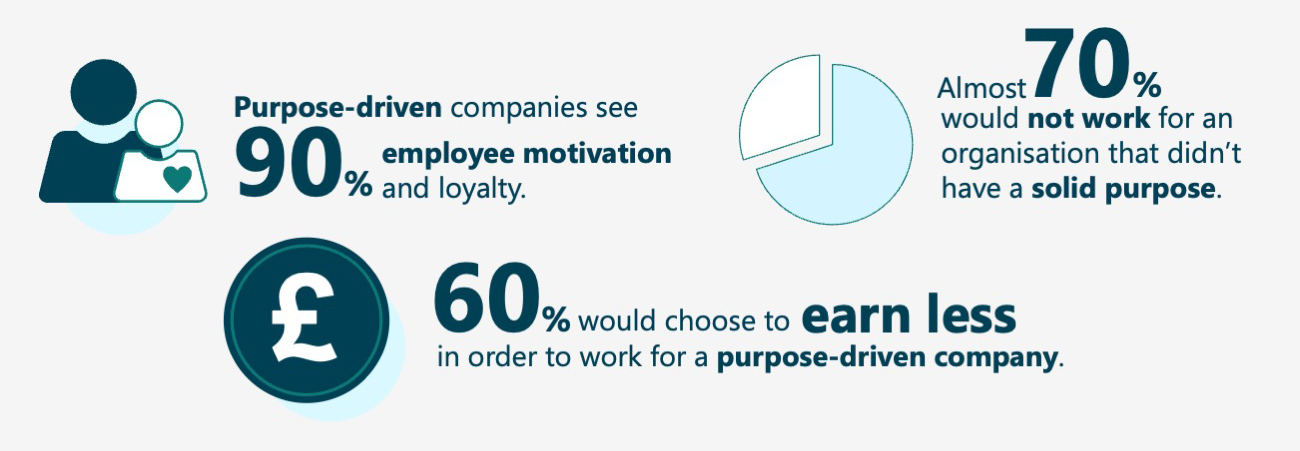Why purpose-driven companies are more successful

A cultural transformation has occurred in the last couple of decades and is now undeniable: It is no longer enough for companies to be profitable; they must contribute to a sustainable planet and a fairer society. They must have a social purpose.
Data from a consumer survey by EVERFI from Blackbaud backs this up:

Beyond consumers’ perceptions, organisations also need to consider the expectations of their workforce 1:

The cultural change surrounding the role of business is so significant that it affects companies’ profits. Investors and banks are even using social and environmental impact as a criterion for funding:
- 58% of purpose-driven organisations grew 10% or more in three years, compared to 42% that are not purpose-driven 1
- A strong ESG strategy results in an uptick of 10% to 20% in business valuation 3
- UK Government procurement teams will take 10% off an organisation’s score if it doesn’t have a solid CSR/ESG strategy
What does it mean to be driven by purpose?
A company’s purpose is twofold: to solve issues for people and for the planet, and to not gain from causing problems. This means not only returning interests on investment, but providing meaning to employees, contributing positively to society, reducing its impact on the environment, delivering value for clients, and encouraging positive changes and innovation.
Organisational purpose is often referred to in terms of Corporate Social Responsibility (CSR), Environmental, Social, and Governance (ESG), community engagement, or social impact. In the UK, it translates into programmes overseen by functions as varied as Human Resources, Marketing, and Public Affairs. More recently, there has been an increase in job roles focused specifically in driving organisational purpose: there is an increasing number of people heading departments of Responsible Business, Social Purpose, ESG, CSR, and similar functions.
What does purpose look like?
While organisational purpose should run deep in corporate strategy and in all corporate activities, it is clearly visible in initiatives focused on contributing to society at large. These can include a variety of short- and long-term programmes, from those that are small in scope to those with a significant impact. Here are a few examples:
- Volunteering events or incentives to employee volunteering
- Educational programmes for the community
- Support for young people entering the job market
- Charitable donations or company match for employee fundraising
- Investment in infrastructure and community spaces
- Sponsorships and scholarships
Social purpose initiatives can have a different focus depending on an organisation’s industry, location, values, and social or environmental impact. For example, a bank might want to offer future clients financial education, a company with a large regional presence might support local young people with career advice and skills development, and a technology company may help children develop STEM skills. Organisations can impact society in a myriad of ways.
Time for action
It is imperative that your organisation lives and breathes its purpose. How are you demonstrating this purpose in real life? Can you do more to contribute to a fairer society? How can you leverage your social impact initiatives to give employees more opportunities do find meaning and purpose at work?
Learn how to create effective CSR programmes
Read our Guide to Meaningful Social Impact
Stay Informed
Best practices, the latest research, and insights from our expert network of partners, delivered right to your inbox.
Success!Thank you for signing up. We'll be in touch with more relevant content.







